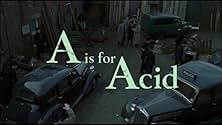Ajouter une intrigue dans votre langueJohn George Haigh, the notorious "acid bath murderer" in 1940s England, becomes the subject of this dramatization.John George Haigh, the notorious "acid bath murderer" in 1940s England, becomes the subject of this dramatization.John George Haigh, the notorious "acid bath murderer" in 1940s England, becomes the subject of this dramatization.
- Réalisation
- Scénario
- Casting principal
- Steven Rogers
- (as Chris Ettridge)
Avis à la une
. It is a nice performance and the production values are splendid seldom has England in the 1940s been better evoked, but there is something missing. What happened is clearly conveyed. How it was done is depicted as graphically as most audiences could reasonably take. But, the question of "why" is left hanging, as it were. Was it for the money? Did Haigh, like Dr Shipman, just get a kick out of killing? Or, despite the opinion of the dozen or so experts the prosecutors and the Home Office consulted, was Haigh crazy? At the trial, not shown in this film, Haigh, represented by top-flight counsel paid for by "The News of the World", pleaded insanity. Only one psychiatrist gave evidence for the defence, to such little effect that the prosecutor didn't bother to cross-examine him.
Well, it's not the film-makers' fault that Haigh was one of those bland serial killers who defy understanding. In line with his own account, Haigh's Yorkshire Plymouth Brethren parents are depicted as strict and narrow, but not as unloving. He turned to crime at an early age and had quite a record of petty dishonesty offences. For him, prison was Crime University and he hatched the idea for his body disposal method, the acid bath, while inside. He was capable of conducting an emotional relationship with the youthful "Gillian" (Keely Hawes) while luring his victims to their deaths.
For what it's worth I think Haigh's train of thought went something like this: "I am an outsider, society does not value my true worth, I will be good to people who do really appreciate me (like my parents and Gillian), and the rest are fair game." At least it makes more sense than the vampire theory. Haigh is also one of those criminals who were bound to be caught sooner or later (his arrest was not a miracle of detection), which makes one ask: did he think he was invincible or did he really want to be caught? The film doesn't help us with this, but it's a good reconstruction and a fine piece of acting by Martin Clunes.
The film has a similar attention to detail as "10 Rillington Place" and Martin Clunes is excellently creepy as the charming Mr Haig. The contrast is small between Haig's day-to-day behaviour and the actual murders and disposals of the body but fascinating, leading to comparisons with Richard Attenborough's portrayal of Christie in 10 Rillington Place, but this film is more darkly humorous.
The film is written by Taggart creator Glenn Chandler and directed by Harry Bradbeer who directed most of the excellent BBC series "The Cops".
Lovely Poirot-style production, with oodles of acting quality. No great psychological insight, but at least the moral brigade is kept at bay and the natural horror seeps through the period atmosphere.
It refuses to creepify in the acid bath scenes - the last victim might have breathed in then gurgled out a great bubble of blood, but no - so a gentle horror, which was fine by me. I still took pleasure in the pace and performances, the setting and sound.
Overall, nicely judged and a good surprise.
Le saviez-vous
- GaffesIn 1945, the widow Olive Durand-Deacon describes her husband as having served in "The Glorious Glosters". Although a common nickname for the Gloucestershire Regiment, it derives from their heroism at the battle of the Imjin River during the Korean War - in 1951.
- Citations
[for the third time, Haigh is in prison for fraud]
John George Haigh: Do you realise, without a body, there can be no conviction for murder?
Morrison: Blimey. Gerra way.
John George Haigh: It's true. The law is called "corpus delicti".
Morrison: So who are you gonna murder, then?
John George Haigh: Well, if you get 21 months for doing very little, might as well do something big.
- ConnexionsFeatures Nosferatu le vampire (1922)
- Bandes originalesWhen the Lights Go On Again
(uncredited)
Performed by Vera Lynn
[detectives inspecting the first crime scene]
Meilleurs choix
Détails
- Date de sortie
- Pays d’origine
- Langue
- Aussi connu sous le nom de
- Crimes Quase Perfeitos
- Lieux de tournage
- Bradford Industrial Museum, Moorside Mills, Moorside Road, Eccleshill, Bradford, West Yorkshire, Angleterre, Royaume-Uni(Haigh's parents' house and neighbourhood)
- Sociétés de production
- Voir plus de crédits d'entreprise sur IMDbPro
























